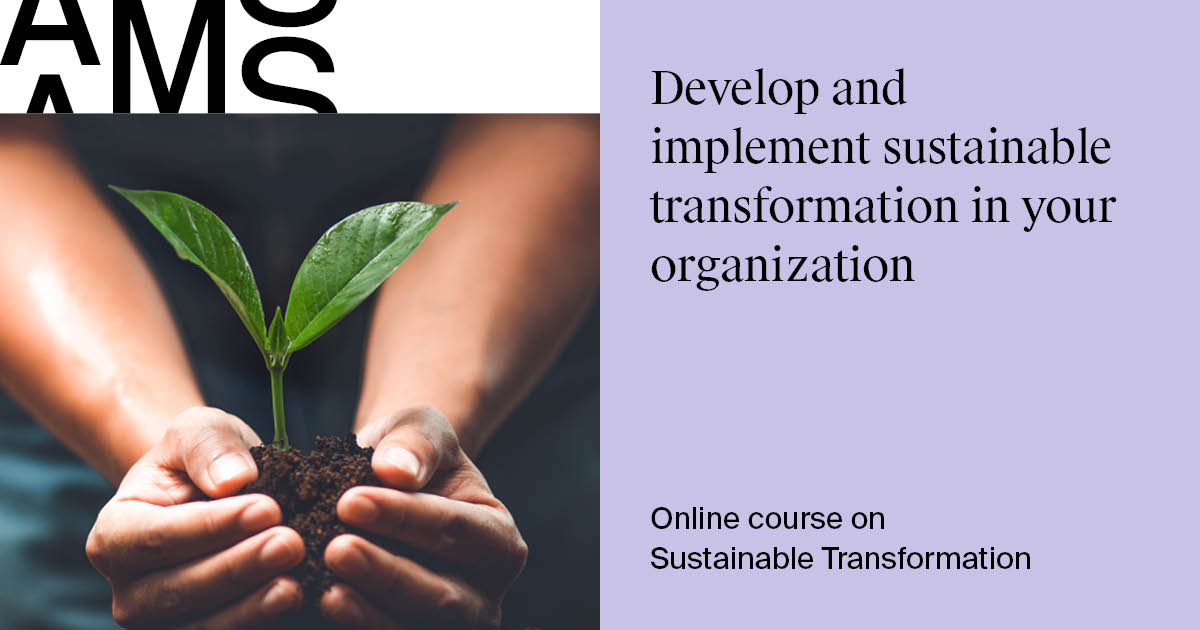Since sustainable development was first defined in “Our Common Future” (a 1987 UN report) as ‘development that meets the needs of the current generation without compromising the ability of future generations to meet their needs’, we have made a lot of progress. The vast majority of governments have signed international agreements such as the UN Sustainable Development Goals (SDGs) and the Paris Climate Agreement, as well as implemented national sustainability policies and regulations. And most large companies have committed to strategic frameworks such as the UN Global Compact implemented management systems such as ISO 14001 (on environment) and issued public sustainability reports in accordance with the Global Reporting Initiative (GRI G4) or other guidelines.
We should be proud, but also cautious, and not one bit complacent. The sad fact is that if governments and businesses continue on the current path of progress, we will not achieve a sustainable future. On the contrary, we are still on track for “overshoot and collapse” in our global society, a prediction first made in 1972 by the Club of Rome’s Limits to Growth study and most recently reiterated by dynamic systems modeler Jorgen Randers in his forecast for 2052.
In other words, there are five forces of fragmentation in society that need tackling if we are to create a sustainable world – namely disruption, disconnection, disparity, destruction and discontent. I have written about these previously and they make a compelling case for the need to fundamentally transform our economic, socio-political and business systems.
I have also explained before that the reason we need a transformative approach is that our current business responses are still incremental (using a continuous improvement, management systems approach to create micro-scale, gradual improvements), peripheral (typically, as a function of corporate affairs or with its own department, but not integrated into every part of the business) and uneconomic (hence, unrewarded by the market, which fails to price in externalities, thus allowing unsustainable companies to flourish).
By contrast, many of the social and environmental problems we face are large, urgent and getting rapidly worse. In short, the business response does not add up to the societal need; the scale of the solution does not fit the scale of the problem. And that is quite simply because the short-term oriented, shareholder-driven capitalist system itself needs to be reformed.
Four Keys to Transformation
1. Positive Futures
At AMS, we are working on four main keys to this fundamental societal transformation. The first is Positive Futures. In the past few decades, we have completely failed to convince most people that a sustainable future is a better future. That sounds crazy, but it is true. As I wrote in my book Sustainable Frontiers, “sustainability is like a geeky, pimply teenager who has come to our party, turned off the music and told us that we would really be much happier if we stopped having so much darn fun! The key to having a good time, our party-pooper declares, is to practice a lot more self-restraint.” By contrast, if sustainability is going to succeed, it must be less about sacrifices and more about opportunities; less about constraints and more about abundance. So this work is about visioning – creating credible, compelling, consensus scenarios of the future that are so desirable that they create a positive movement to bring them into being.
2. Integrated Value
The second key to transformation is Integrated Value. I have written about this in more detail in a previous AMS blog, but it is essentially about changing how we measure value in society – and more especially, how we measure business value in society. There are many problems we are trying to solve here: myopia (companies’ narrow focus on financial value creation, often at the expense of other negative impacts); proliferation (with thousands of sustainability-related KPIs being reported by companies, but no clear framework to make sense of them); comparability (most of these sustainability metrics are locked away in Pdfs or scattered on corporate websites, with no easy way to benchmark performance); materiality (many financial analysts, customers, managers and others do not see these “non-financial measures” as very important); and externalities (companies are still not required to measure and pay for the costs they impose on society and the environment).
3. Meaningful Innovation
The third key to transformation is Meaningful Innovation. For the past 50 years, we have been trying to incrementally manage our way out of the sustainability crises that we face – and by and large, we have failed. Many of our global problems – be it climate change, socio-economic inequality, biodiversity loss, political corruption, or involuntary migration – are still getting worse, not better. Sometimes the only answer to an intractable problem is a fresh perspective. Necessity is the mother of invention – and we desperately need innovation to transform our unsustainable economy. Fortunately, there are many emerging examples of hybrid business models that are turning the old “fracture economy” into a nexus economy. We see this manifesting in the resilience economy (a counter-force to disruption), exponential economy (countering disconnection), access economy (tackling disparity), circular economy (reversing destruction) and wellbeing economy (addressing discontent).
4. Purposeful Leadership
The fourth key to transformation is Purposeful Leadership. Research I have conducted with Cambridge University’s Institute for Sustainability Leadership shows that there are many distinctive characteristics of leaders who are driving positive change in society. At AMS, we work with leaders who apply systemic, disruptive, inclusive, sustainable and ethical approaches to respond meaningfully to society’s challenges. We also believe that leadership is not only “from the top down”, but also “from the bottom up” and “in the middle”. Distributed (or shared) leadership is central to the work of our AMS Leadership Expertise Centre and to the way in which we nurture leaders through our Masters and other programs. It also builds on my research on the four types of purpose-inspired leadership: experts, facilitators, catalysts and activists – which I have also referred to as our inner sustainability superheroes.
Getting Beyond the First Step
The ancient Taoist philosopher, Lao Tzu, said “the journey of a thousand miles begins with the first step”. In sustainability, we have taken that first step – in some cases, more than one – but the journey is long and we need to persevere. I am often asked whether I am an optimist or a pessimist about the future, and I usually answer: well, if I focus on the data that describe the problems, it is hard not to be pessimistic; but if I focus on the people that are creating the solutions, it is hard not to be an optimist. Here at the AMS Future Leadership research, we try to do both – acknowledging the seriousness of the negative trends, but working with the companies, leaders and students that are innovating to bring a brighter future into being. Hence, we are “possibilists” – we believe a sustainable future is possible, if we achieve a clear vision together (positive futures), change how we measure progress (integrated value), support creative solutions (meaningful innovation) and work on growing effective champions for change (purposeful leadership). I hope you will join us along the way.
Discover how your organization can master sustainable transformation.





